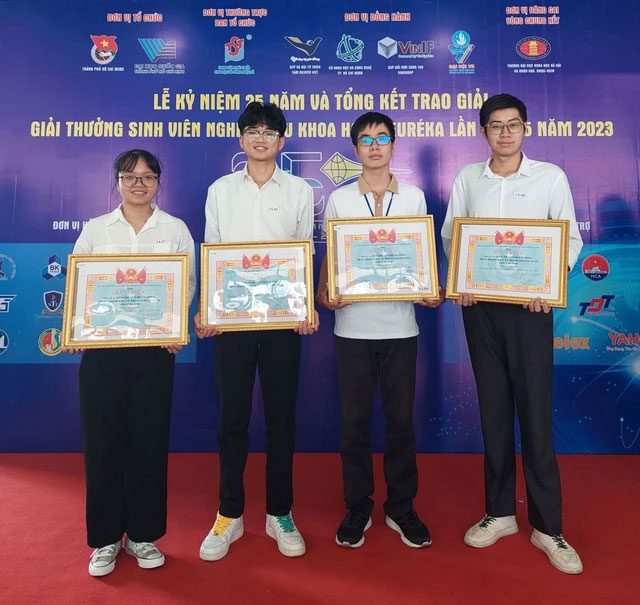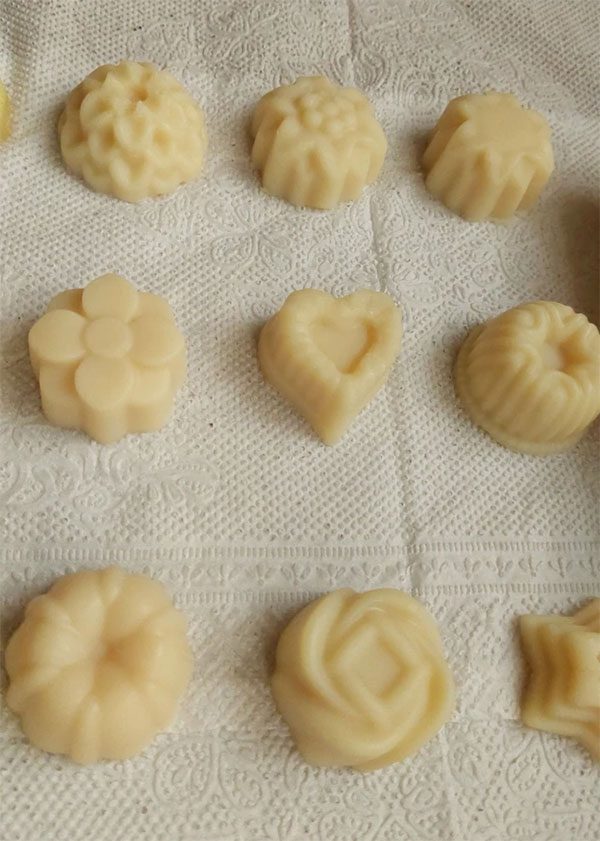Through the saponification reaction of fats when in contact with a strong alkaline solution, a group of students successfully researched recycled soap from used cooking oil.
After more than 9 months of research, a team of students from the Faculty of Environment at Saigon University (Ho Chi Minh City) – including Sato Do, Doan Trong Kha, Cao Hoang Phuc, and Le Hoang Khanh Ngan – produced their first completed soap sample. Two types of soap, solid and liquid, developed by the research team are priced at 30,000 VND per product.

The students from Saigon University (Ho Chi Minh City) receiving an award at the 2023 Eureka Scientific Research Student Competition. (Photo provided by the individuals).
Presenting their project, team leader Sato Do noted that through surveys, most used cooking oil is directly disposed of into the drainage system. This is one of the reasons urban drainage systems become clogged and cause water pollution due to the accumulation of cooking oil. From this reality, the student team aimed to research solutions to recycle used cooking oil into cleaning products.
The used cooking oil collected by the team from households is filtered, deodorized, and then mixed with a diluted NaOH solution. Next, clay powder and coloring agents are added to the mixture and stirred until it thickens, followed by pouring it into molds. Finally, this mixture is dried in a cool room to allow the saponification process to complete. After 7 weeks, the soap product is ready for use.

Soap made from used cooking oil. (Photo provided by the individuals).
Cao Hoang Phuc shared that the team has researched and developed a formula to calculate the appropriate amount of NaOH needed for the saponification of cooking oil, preventing the soap from having a high pH that could harm users’ skin. The team also adds essential oils to create a pleasant scent and designs the soap in various shapes to enhance its aesthetic appeal.
The Saigon University student team reported that initially, they faced numerous challenges in balancing their main academic responsibilities while ensuring research progress. Despite applying much of what they had learned, the team’s early experiments failed as the soap still retained a cooking oil smell. After each failure, the team would evaluate together to find an improved formula for the next trial.
“The team is continuing to refine the cooking oil recycling process to make it simpler, so people can make soap at home. This way, everyone can contribute to protecting the urban drainage system while saving money on cleaning products,” team leader Sato Do expressed enthusiastically.
Ms. Nguyen Thi Ngoc Thao, a lecturer at the Faculty of Environment at Saigon University, highly appreciates the community significance of the recycled soap product made from used cooking oil. However, she pointed out that if this product is to be produced on a larger scale, the team needs to consider challenges, especially in the collection process for recycling materials.
| “Experience shows that soap made from used cooking oil has good cleaning ability but does not retain fragrance for long. Additionally, compared to regular soaps, this soap is softer and produces less lather,” Ms. Thao commented. |
The soap product made from used cooking oil won third prize in the Natural Sciences category at the “Student Scientific Research” competition at the university level, and received an encouragement award at the Eureka Scientific Research Student Competition 2023 organized by the Ho Chi Minh City Youth Union in collaboration with the Vietnam National University.
Hosting workshops to “upgrade” the product Alongside their research, the student team also organizes workshops for those interested in protecting the environment and looking to relax on weekends. Besides sharing their experiences and research results, the team directly guides participants on how to recycle used cooking oil into soap. By organizing these workshops, the team raises funds to continue their research while also receiving feedback from customers during the product use process. This allows the team to “upgrade” future versions to be of higher quality. |


















































